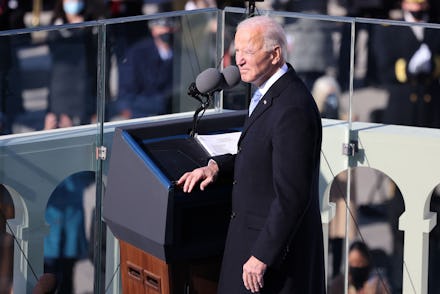Biden's Day 1 immigration plan is ambitious, and Republicans already hate it

The newly sworn-in Biden administration is already getting to work overturning four years of Trump administration policies, tackling everything from the COVID-19 pandemic to economic insecurity. But Biden also has plans to address the country's immigration system, which has long been a political quagmire. The system under former President Donald Trump largely penalized people for wanting to live and work in the U.S., rather than welcomed them, but that tone is set to change, per a Day 1 legislative package from President Biden that addresses immigration, citizenship, and federal security at the U.S.-Mexico border.
"This legislation provides new pathways to citizenship, promotes smart border controls, and ... addresses the root causes of migration," said Susan Rice, the former U.N. ambassador and national security adviser whom Biden tapped to be his domestic policy czar. Specifically, the legislation would offer a pathway to citizenship for the nearly 700,000 undocumented people currently protected from deportation by the Obama-era program known as Deferred Action for Childhood Arrivals (DACA). The 2012 program, created by former President Barack Obama via executive order, has long drawn ire both because it was enacted without congressional approval and because it keeps people in a sort of limbo legal status that is subject to court challenges and political preference. Under Biden's proposed legislation, DACA recipients would immediately be able to apply for green cards; after three years, they'd then be able apply for citizenship.
The legislation sent to Congress on Wednesday would also offer a path to citizenship for 11 million other undocumented people living in the U.S. after a period of eight years. The bill will also, however, attempt to address what the administration sees as the "root causes" of immigration, namely economic and political insecurity in countries where many people emigrate from.
"Ultimately, you cannot solve problems of migration unless you attack the root causes of what causes that migration,” one unnamed official said to The Washington Post. "[Biden] knows that in particular is the case in Central America." The official added that the Biden administration's legislation intends to redress the lack of humanity and disorder within the Trump administration's immigration policies, while still acknowledging that overall, the process will be slow-moving: "It’s also been made clear that that isn’t a switch you flip overnight from [Jan. 19] to the 20th, especially when you’re working with agencies and processes that have been so gutted by the previous administration," they said.
While three and eight years respectively are long periods of time to wait for basic protections afforded to most citizens, the measure, as the Associated Press pointed out, would constitute the fastest shift in documentation status of any recent presidential administration. The legislation also does not include major moves to increase border security, though it shifts security measures from Trump's prized border wall to new technology, per ABC News. While that may signal a new approach to preventing people from crossing the southern border without documentation, progressive groups take issue with idea of enforcement at all.
The bill would also build back America's refugee program, allowing more people fleeing persecution, war, famine, and other disasters admission to the U.S. It's something that Stephen Miller, the man behind Trump's family separation policies, bludgeoned early in Trump's term.
Of course, whether or not this massive legislative approach to immigration reform takes hold is largely up to how much Democrats want to play politics. It's an ambitious plan for a narrowly divided — albeit Democratically controlled — Congress, and one that already faces opposition from Republican leaders. And this is critical: While the executive orders Biden is scheduled to sign on his first day in office are a relatively seamless unilateral political move, legislation requires the consent and cooperation of Congress. And on immigration, Congress has hardly been cooperative.
With Vice President Harris as the tie-breaking vote in the Senate, Democrats could theoretically pass any legislation they want, as long as they avoid the filibuster. But doing so could potentially alienate Republicans even more than they already are. It's unlikely that centrist Democrats, who tout political norms of civility, order, and urge the country to unify, will feel compelled to pull this move on Day 1 — but with Biden choosing immigration as his first big swing, it signals the president might be more ready for battle than he seems.